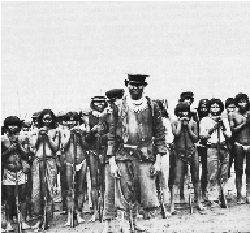Travel Reference
In-Depth Information
inspect, practically in full view, their inexpert adversaries, unaware of the sinister civilized one who
spies on them, counts them, and observes their every habit, evaluates their resources—and returns
after this minute review to his waiting companions with all the intelligence necessary for the con-
quest.
Conquest
is the preferred term—it's used as a kind of atavistic reminder of the patois of the ex-
peditions of Pizarro. But the
caucheiros
do not proceed with weapons without first exhausting the
influence of the rudimentary diplomacy of gifts coveted by the natives.
We heard this from one: “We attract them to the outpost with gifts—clothes, rifles, machetes,
etc.—without making them work. We let them go where they like so they can report to their compan-
ions how they are treated by
caucheiros
, that we don't make them work, although we advise them to
work a little to pay for what we give them . . .”
“Peaceful”meansofconquestwerenottobetrusted.Therulewastheunholyhunt,withguns.This
was the “heroic” side of the business: a sordid band daring to subjugate a multitude.
There is no lack of examples.
These bands were guided by an unvarying tactic: maximum audacity, maximum intensity of fire.
Such were the guarantees of triumph. There were an incalculable number of little battles throughout
the forests in which well-armed posses supplanted entire tribes, who in their naive charges against
the rifles were immolated by the carbines' thunder. We cite here but one instance. Carlos Fitzcarraldo
arrived in 1892 at the headwaters of the Madre de Dios by way of the Ucayali. Between the rivers he
had opened the trail that still bears his name. He planned to capture the indomitable Mashco Indians,
who were the masters of the region. Among his Piro Indian bearers and captives was a loyal and in-
telligent translator. Fitzcarraldo was thus able to meet and converse with the native head man.
This meeting was curious and brusque.
The eminent explorer was introduced to the “heathen” and showed them his weapons and other
equipment as well as his small army, in which were mingled the varied physiognomies of the tribes
he had subdued. Then he tried to demonstrate advantageous alternatives to the inconvenience of a
disastrous battle. The sole response of the Mashco was to inquire what arrows Fitzcarraldo carried.
Smiling,theexplorerpassedhimabulletfromhisWinchester.Thenativeexamineditforalongtime,
absorbed by the small projectile. He tried to wound himself with it, dragging the bullet across his
chest. Then he took one of his own arrows and, breaking it, thrust it into his own arm. Smiling and
indifferent to the pain, he proudly contemplated the flowing blood that covered the point. Without
another word he turned his back on the surprised adventurer, returning to his village with the illusion
of a superiority that in a short time, would be entirely discounted.

Search WWH ::

Custom Search